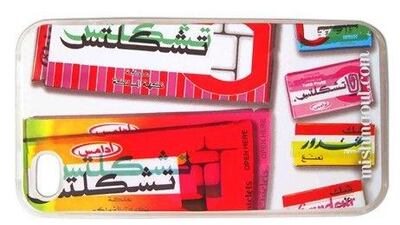Rana Salam, one of the Middle East's most celebrated graphic artists, is at the dentist's when I call. Her nanny has a toothache and they are waiting for an appointment. "Not very glamorous," she says, with a deep, throaty laugh. "Everybody has gone quiet and is listening to our interview," she adds. "It's a bit embarrassing."
Salam's distinctive portfolio of work, an unashamed celebration of Middle Eastern pop art, includes everything from dramatic window displays for Harvey Nichols to seductive packaging for Cocomaya chocolates, and the deliciously-named book, The Secret Life of Syrian Lingerie. She has also partnered with those other stalwarts of Lebanese design, Bokja, on a new brand identity, and Nada Debs, where she was responsible for developing the textile designs for Debs' famous Floating Stools.
Four years ago, Salam launched Mishmaoul, an enchanting webshop selling accessories and items for the home. "I dreamed of the ideal client coming and commissioning me to do a range of products, and that client never showed up. So I positioned myself as my own client and I serviced myself," says the 45-year-old, Beirut resident.
Mishmaoul is a dizzying mish-mash of colour, drama and nostalgia. There are tea towels emblazoned with bright yellow Nestlé cans, 1950s-style coffee tables and cushions inspired by classic Egyptian movie posters. Pictures of old-school Coca Cola bottles, Cortina ice creams and Chiclets chewing gum packets jump off iPhone cases. Egyptian starlet Tahiya Karioka stares out suggestively from bright cushion covers and vivid silk-screen prints advertise the old Egyptian movie, The Honeymoon, in bold Arabic calligraphy. While Mishmaoul is a web-based brand, Salam also organises the odd pop-up shop and her products are now available for the first time in the UAE, at O' de Rose in Dubai.
Salam describes her style as "sophisticated pop" but is tired of the constant comparisons to Andy Warhol. "There were many other artists from the pop era other than Andy Warhol," she says. She's also uncomfortable with her work being described as kitsch. "I love kitsch but unfortunately it is often associated with bad taste. My work is inspired by kitsch but it is definitely pop."
Which goes a long way in explaining her love of Swatch watches. "It's such a wonderful brand and they always collaborate with such great designers. Swatch was the first real pop brand of the 1980s. I'd love to design a watch for them with pop culture portraits from the Middle East."
It is notable that the Lebanese-born Salam only truly learnt to appreciate Middle Eastern culture once she moved to London, where she lived for 25 years before returning to Beirut two years ago. "I trained as a graphic designer at both Central Saint Martins School of Art & Design and at the Royal College of Art in the UK. Through that training, I was encouraged to go back and rediscover my culture and celebrate it. It's not what I expected from my education in London," she says.
Her thesis, Beirut: Design under Civil War, coupled with her first commission, a window display for Harvey Nichols, set the tone for a career that has focused on revisiting and reimaging the visual culture of the Middle East. For Harvey Nichols, she commissioned traditional Armenian street and cinema artists to create a vibrant celebration of Lebanese and Egyptian pop culture in the heart of Knightsbridge. This was the first and most challenging of all the projects she has worked on, she recalls. "It was all painted in the backstreets of the Armenian Quarter in Beirut and then shipped to the UK."
Salam became an avid collector of old Egyptian movie posters and, in 1999, collaborated with the Institute of International Visual Arts to create an exhibition entitled Egyptian Cinema Posters. And although she doesn't collect them anymore, they continue to play an integral role in her work. "I try to extract and manipulate the things that I love about them in my work - the naivety, the charm, the drama and the illustration techniques. They represent a period that's been lost.
"But I was collecting them in the 1990s. Now everybody's discovered them. They are much easier to get hold of and they've become a bit used and abused."
Her new love is vintage Vespas, she reveals. She recently acquired her first and, the day before we speak, had spotted another that she now has her eye on. Which leads us on nicely to the subject of motorcycles. I ask whether rumours that Salam was the first woman in Beirut to ride around on a scooter are true. "Oh, where did you read that?" she asks, laughter rising again. "It's true. I was 15. My dad decided to buy us scooters and it changed my life. He essentially bought us freedom. I was exposed to street life in a way that that I wouldn't have been from a car. I gained access to street popular culture and that has been so important to my work."
The "street and its people and their behaviour" is still Salam's primary source of inspiration. And while Beirut has not changed dramatically since she started exploring the city, there is much greater access to European brands these days, which has led to a more "fluid" integration of western culture and a greater awareness and understanding of design, she says.
While Salam remains committed to "sending cool Middle Eastern messages through products", she has recently started to experiment with a more minimalist style. Recent projects, which include new brand identities for the London-based interior design store, Mint, and an Oriental bakery and coffee house in Jeddah called Kalila, have seen her "take a break" from her customary style and explore a more refined style of pop.
I ask what's next on the agenda. "It's always a mystery," Salam says, "but things always pop up! Always." No pun intended.
Mishmaoul products are now available from O' de Rose, 999 Al Wasl Road, Dubai.


